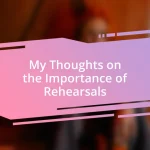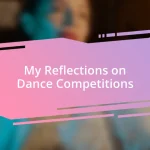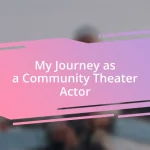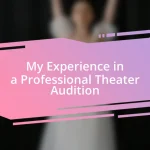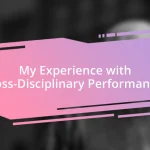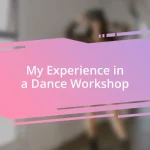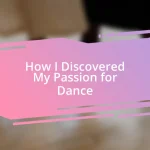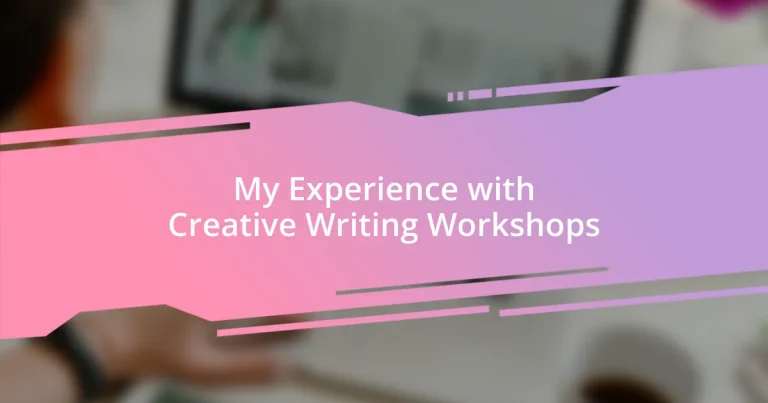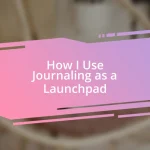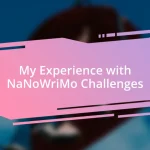Key takeaways:
- Creative writing workshops foster a supportive community where writers can share their experiences, receive constructive feedback, and explore diverse perspectives.
- Key techniques learned include “show, don’t tell,” authentic dialogue crafting, character development, and embracing vulnerability in peer critiques.
- Participating in workshops encourages personal growth and creative risk-taking, allowing writers to connect emotionally with their stories and audiences.
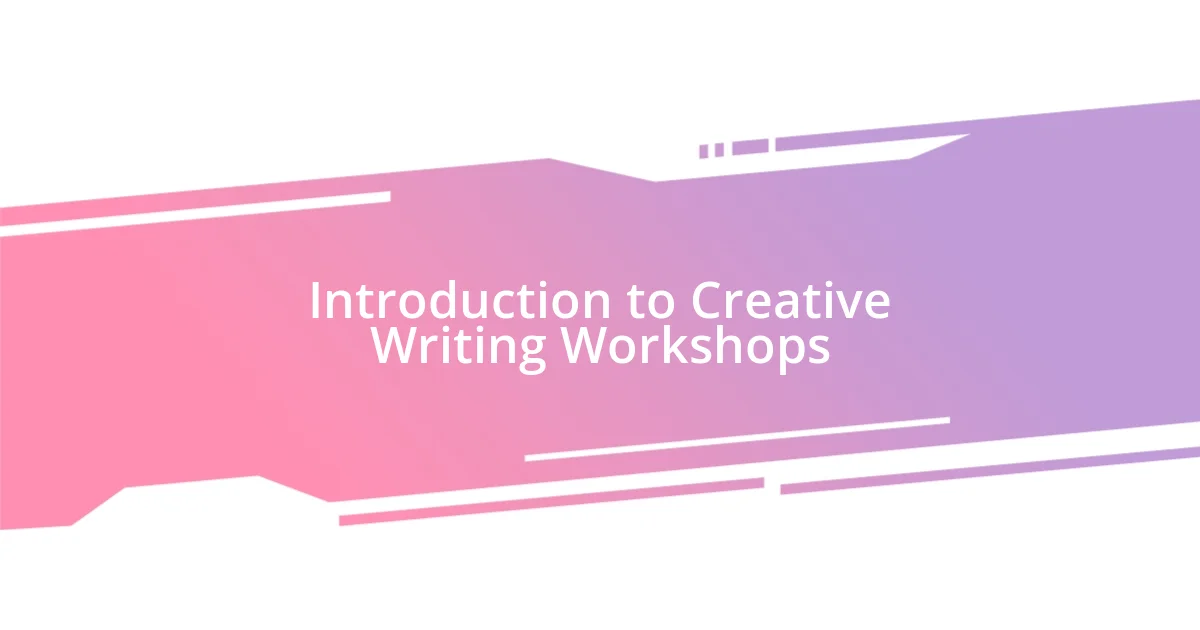
Introduction to Creative Writing Workshops
Creative writing workshops offer a unique space for aspiring writers to hone their craft and express their stories. I remember my first workshop vividly—sitting in a circle with strangers who quickly became compatriots in creativity. Was it intimidating? Absolutely. But there’s something magical about sharing your work and receiving feedback from those who understand the struggles of putting pen to paper.
These workshops often blend guidance with freedom, allowing participants to explore their voice while learning the mechanics of storytelling. I often found myself experimenting with styles I hadn’t dared to try before. It’s refreshing! How often do we get the chance to step outside our comfort zones and take risks in a supportive environment?
Moreover, the emotional connections built in these settings are just as valuable as the writing skills gained. Every sharing session felt like a revelation—not just of writing, but of shared human experiences. You realize writers are not alone in their doubts and dreams. Isn’t it reassuring to know that what you feel is echoed in the words of others? That’s the beauty of creative writing workshops; they foster a sense of community where creativity thrives.
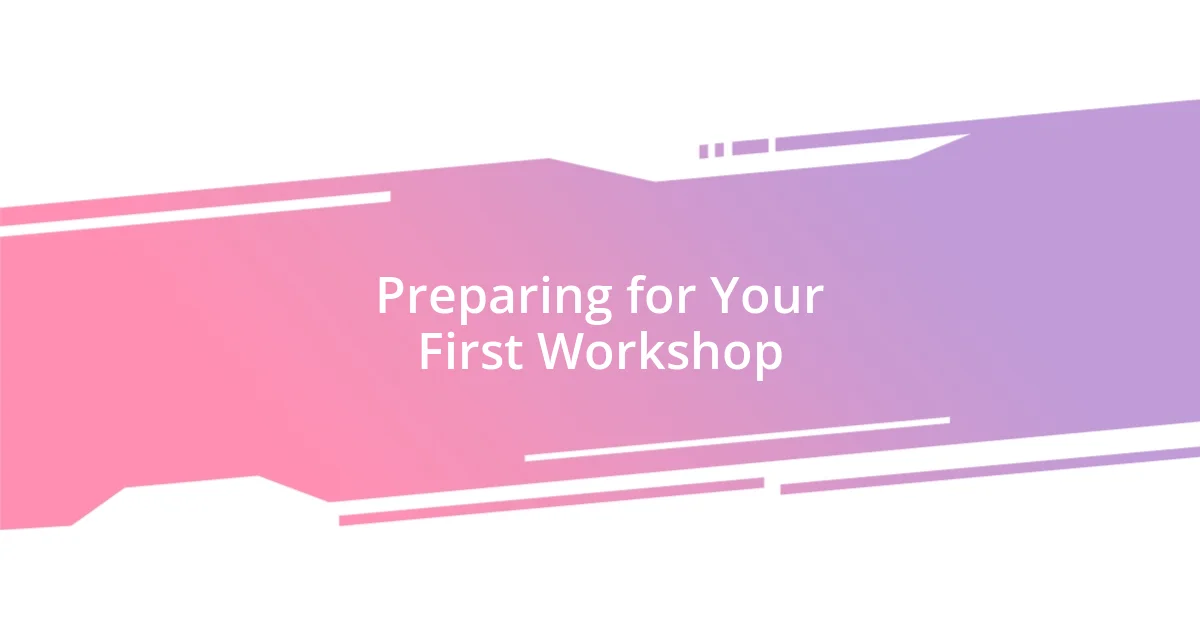
Preparing for Your First Workshop
Preparing for your first creative writing workshop can be both exciting and nerve-wracking. I vividly recall the mixed feelings I had—an electric thrill mixed with anxiety. To ease those jitters, I recommend bringing a piece of writing that represents your style. Sharing your own work can be daunting, but there’s comfort in knowing others are likely just as apprehensive. Remember, everyone is there to learn and grow!
It’s also beneficial to familiarize yourself with workshop etiquette. Early on, I had to learn the balance between offering constructive criticism and being supportive. Think about how you’d feel receiving feedback on your work—this mindset helps create a positive, encouraging atmosphere. When I started, I appreciated when individuals not only pointed out areas for improvement but also uplifted my strengths.
Lastly, prepare to be open-minded. Creative writing workshops thrive on diverse perspectives, and sometimes, the feedback can take you by surprise. I once received a suggestion to explore a completely different theme in a story I thought was solid. Initially resistant, I eventually embraced the idea, which led to one of my favorite pieces. Those moments of unexpected growth are what make workshops so enriching.
| Preparation Tips | Examples from Experience |
|---|---|
| Bring Your Own Writing | Start with a familiar piece to make sharing easier |
| Understand Workshop Etiquette | Learn to give and receive feedback constructively |
| Stay Open-Minded | Be ready for unexpected feedback that can spark creativity |
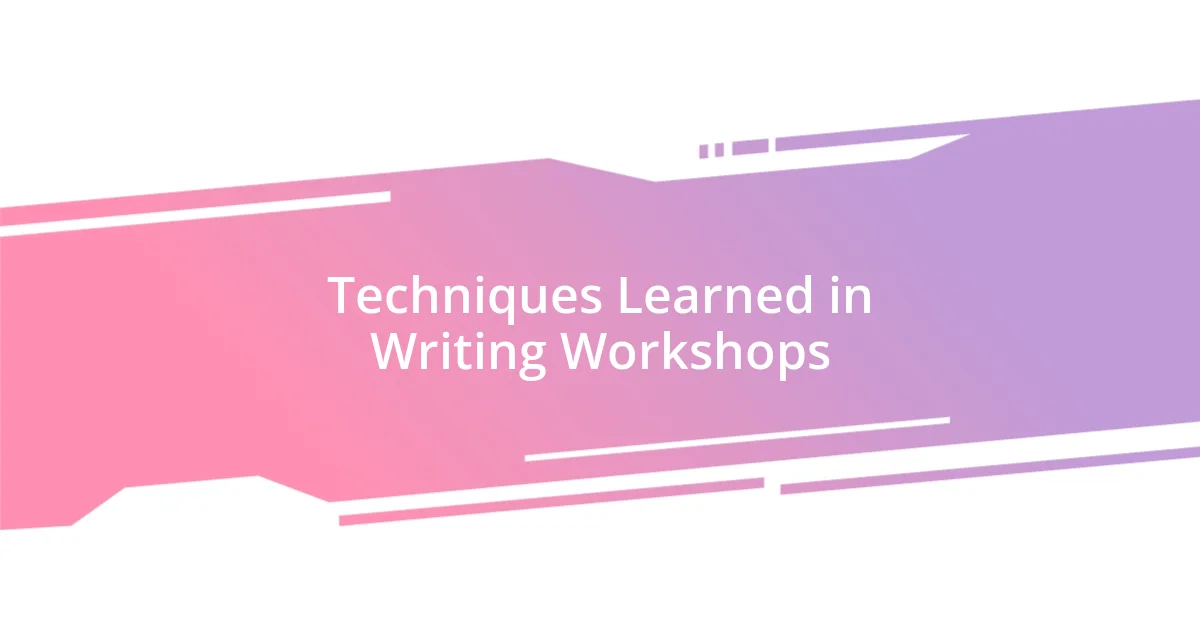
Techniques Learned in Writing Workshops
In writing workshops, I picked up a myriad of techniques that fundamentally shifted my approach to storytelling. One standout was the focus on “show, don’t tell.” I remember a session where the instructor made us rewrite a bland sentence about a character’s sadness. Transforming it into a vivid scene—depicting tear-stained cheeks and quivering lips—made all the difference. This technique encourages deeper engagement from readers, allowing them to experience emotions rather than just read about them.
Here are some other essential techniques that I found invaluable:
- Dialogue Skills: Crafting authentic conversations that reflect character personalities and motivations.
- Character Development: Creating layered characters by exploring their backstories and desires.
- Setting the Scene: Using sensory details to immerse readers in the environment.
- Revision Strategies: Learning to see my drafts as opportunities for improvement instead of finished products.
- Writing Prompts: Employing creative prompts to spark inspiration and push boundaries.
Adopting these methods fueled not just my writing but also my confidence. Each workshop contributed to my growth as a writer, and I can genuinely say that the techniques I learned shaped my stylistic choices moving forward.
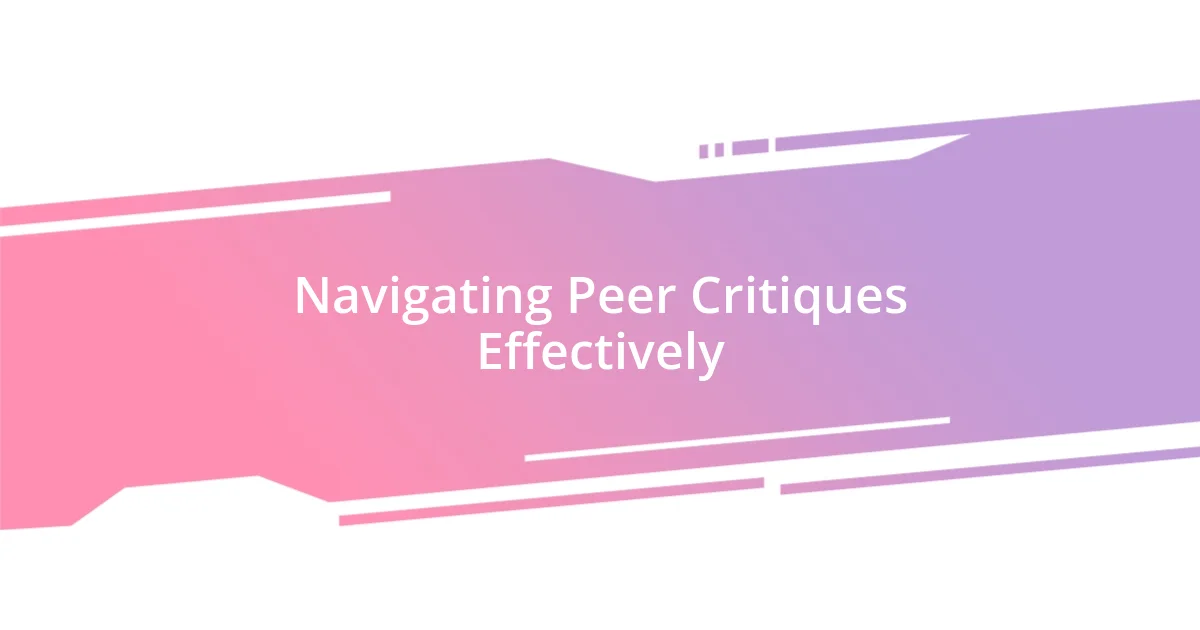
Navigating Peer Critiques Effectively
Navigating the landscape of peer critiques can feel intimidating, but I found it transforms into a rewarding experience with the right mindset. I remember one workshop where a fellow writer shared their poem, and as a group, we gently dissected its layers. It struck me how certain critiques can feel like jabs, yet if approached thoughtfully, they morph into beams of light casting new ideas on the piece. I often find myself asking, “How can this feedback elevate my work?” It’s about shifting that perspective from defense to growth.
During these critiques, I learned the value of balance—celebrating strengths while addressing weaknesses is essential. I once received a critique that pointed out inconsistencies in my character’s motives. Initially, I felt defensive; however, recognizing the constructive intention behind the feedback helped me see it as a roadmap for improvement. When critiquing others, I always strive to highlight their strengths first, believing it creates a more receptive atmosphere for suggestions on areas of improvement.
Moreover, embracing vulnerability is crucial when facing peer critiques. I recall sharing a deeply personal story about loss, holding my breath as eyes scanned the text. The initial feedback was overwhelmingly positive, which brought me relief, but the meaningful critiques that followed prompted me to dig deeper into my emotions and refine my craft. This cycle illustrates the profound connection between vulnerability and constructive feedback. Are we not, as writers, constantly seeking truth in emotion? It’s that quest that makes these workshops invaluable.
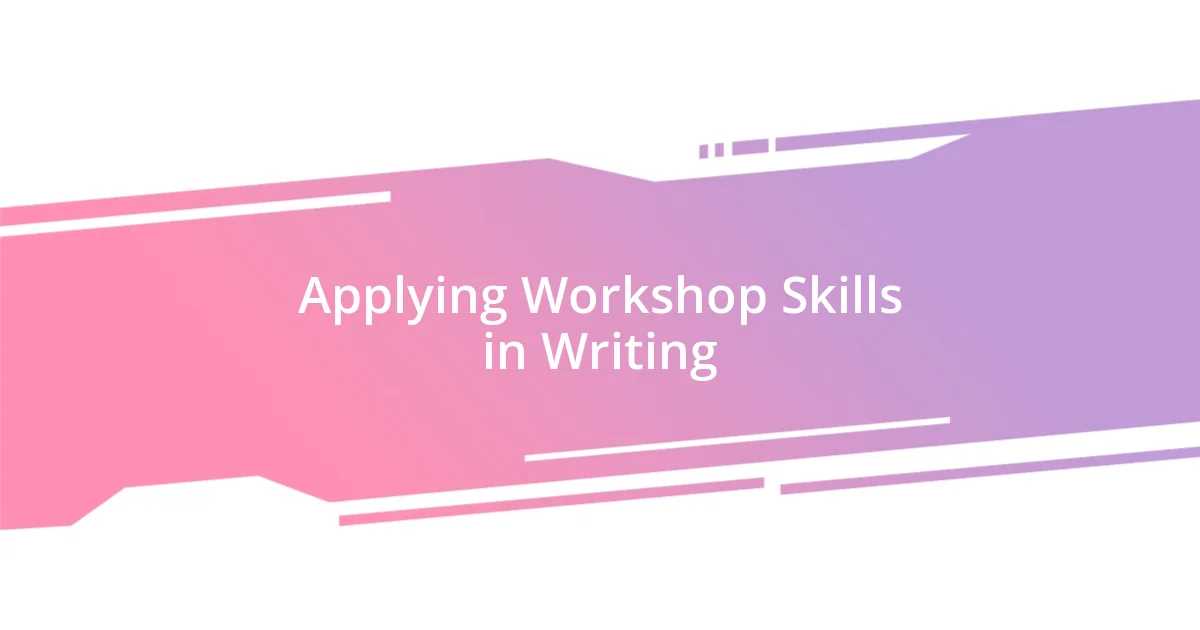
Applying Workshop Skills in Writing
Applying the skills I honed in workshops has been a game changer for my writing. For instance, I now approach every draft with a sense of curiosity rather than dread. I often think back to a workshop where we were encouraged to take risks without the fear of judgment. That moment shifted my mindset; now I embrace the messy process of creativity, allowing me to uncover unexpected gems in my writing.
One tactic that has become second nature is implementing character voice in my narratives. In one session, we were tasked with writing back-and-forth dialogues between two very different characters. That exercise pushed me to explore distinct voices, which now helps me breathe life into my characters. A month later, I was surprised to notice how my protagonists began to leap off the page, their unique voices drawing readers into their worlds as if the lines were pulled from real conversations.
I’ve also learned to value the role of feedback in my revision process. During a workshop, I remember sharing a story that felt complete to me, only to discover through peer discussions that others saw room for abundant enhancement. That initial sting transformed into excitement as I realized their insights could enrich my narrative tapestry. Have you ever experienced such a shift? Transforming criticism into creative opportunities has not only strengthened my pieces but also made me eager to collaborate with other writers moving forward.
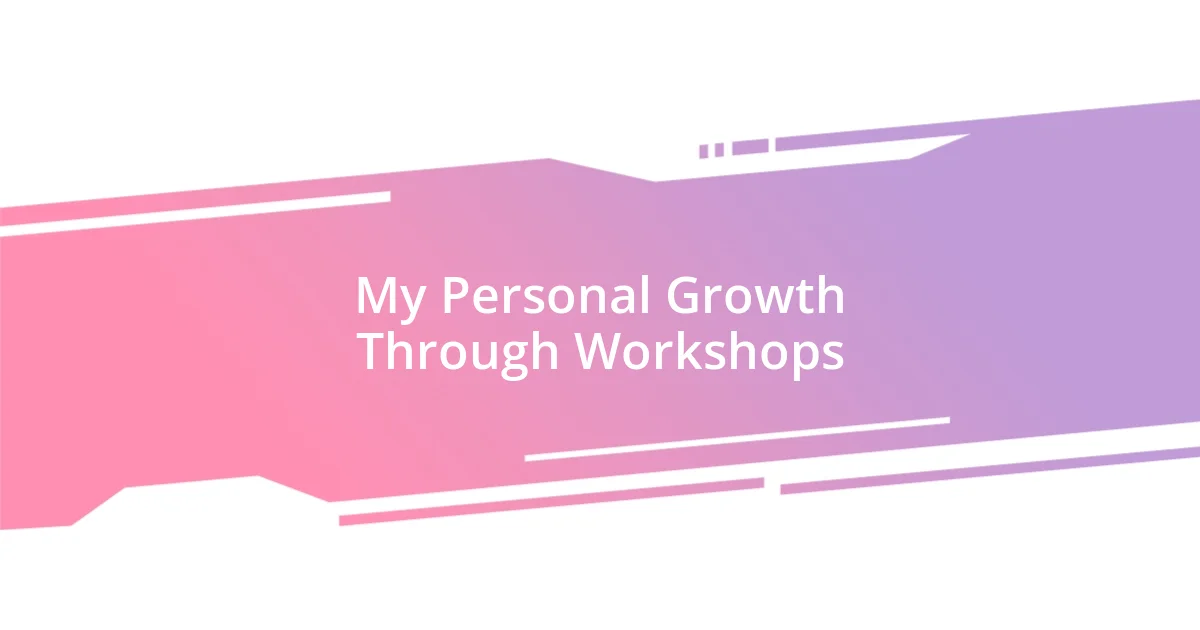
My Personal Growth Through Workshops
Participating in creative writing workshops has truly been a catalyst for my personal growth. I vividly recall the moment when I found the courage to share a short story inspired by my childhood adventures. The warmth of the group’s feedback enveloped me like a comforting blanket, revealing that my experiences resonated with others. That sense of connection deepened my appreciation for storytelling; it’s clear now that every shared tale brings us one step closer to understanding one another.
One of the most profound lessons came from an exercise where we swapped writings anonymously. I was amazed at how someone could articulate an emotion I struggled to express. It made me reflect: how often do we underestimate the power of a different perspective? By engaging with others’ voices, I not only learned new techniques but also discovered my emotional range as a writer, which ultimately helped to enrich my work in ways I hadn’t imagined.
Over time, the workshops empowered me to take more creative risks. I used to shy away from darker themes, but after a session focused on raw honesty in writing, I decided to tackle my fears head-on. I wrote a piece about navigating anxiety, a topic I’d kept close to my heart. Sharing it was nerve-wracking, yet the collective experience became a healing moment for me. Have you ever faced the challenge of exposing your vulnerabilities? The support and insights received in those workshops transformed that fear into fuel, igniting my passion and pushing my writing to uncharted territories.
